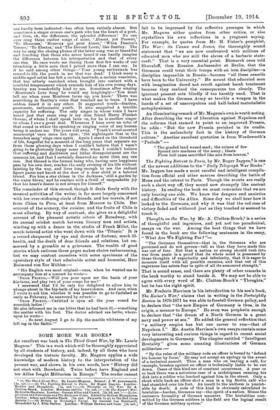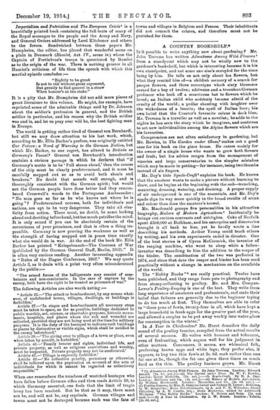SOME MORE WAR BOOKS.*
AN excellent war book is The Third Great War, by Mr. Laurie Magnus.' This is a work which will be thoroughly appreciated by all students of history, and, indeed, by all those who have developed the historic faculty. Mr. Magnus applies a wide knowledge of modern history to the interpretation of the present war, and shows, in his own words, bow " History did not start with Bernhardi. Twice before have England and her Allies fought Militarism in Europe." The reader cannot • (1) The Third Great War. By Laurie Msgnns. Bristol : S. W. Arrowamith. net.]—(2) The Fighting Retreat to Paris. By Roger Ingpen. London: Hodder and Stoughton, [is. net.1—(3) Thoughts on the Her. By A. ChattonHrock. London: Methuen and Co. [Is. net.]--(4) The Kaiser's War. By Austin Na: n eon. London George Allen and Unwin. [22.6d. net.]—(5) Im- perialism and Patriotism and The European Crisis. Edited by Sydney Humphries. London : Adam and Charles Black. pa. net. Proceeds to go to the Red Cross Society.]—(6) Britain as Germany's Vassal. By General von Bernhardt. Translated by J. Ellis Barker. London : William Dawson and Sons. [2a. net.] fail to be impressed by the reflective passages in which Mr. Magnus either quotes from other critics, or else crystallizes his own reflections in a pregnant saying. For example, he quotes from Mr. H. Fisher's pamphlet, The War : its Causes and Issues, the thoroughly sound.
statement that " we are now confronted with millions of educated men who are still the slaves of a barbaric state- craft." That is a very essential point. Bismarck once told Shuvaloff, then Russian Ambassador at Berlin, that the Germans could treat their troops with an iron discipline—a discipline impossible in Russia—because "all these canaille have been to the University." He meant that educated men with imagination dared not revolt against harsh treatment because they realized the consequences too clearly. The ignorant peasant acts blindly if too harshly used. That is what makes the German Army so terrible a weapon in the hands of a set of unscrupulous and half-baked materialistic metaphysicians.
An illuminating remark of Mr. Magnus's own is worth noting. After describing the war of liberation against Napoleon and the reforms that seemed to point to an improved Prussia, he adds : "But the new Prussia perished in its cradle. This is the melancholy fact in the history of German culture." Another excellent quotation is from Wordsworth's "Prelude":—
" The goaded land waxed mad ; the crimes of few Spread into madness of the many ; blasts
From hell came sanctified like airs from heaven."
The Fighting Retreat to Paris, by Mr. Roger Ingpen,2 is one of the newest additions to the "Daily Telegraph War Books." Mr. Ingpen has made a most careful and intelligent compila- tion from official and other sources describing the battle of Mons and the retreat to Paris. Though the events are really such a short way off, they sound now strangely like ancient history. In reading the book we must remember that we are only hearing one side. We know the dangers and anxieties and difficulties of the Allies. Some day we shall hear how it looked to the Germans, and why it was that the red rose of victory faded and withered just as they touched or seemed to touch it.
Thoughts on she War, by Mr. A.• Clutton-Brock,3 is a series of thoughtful and ingenious, and yet not too paradoxical, essays on the war. Among the best things that we have found in the book are the following sentences in the essay, " What Are We Fighting For ? "—
" The Germans themselves—that is, the Germans who are governed and do not govern—tell us that they have made this war out of fear. But that a nation so strong should rush into war from panic is a proof that its whole mind is possessed by these thoughts of superiority and inferiority, that it is eager to measure itself with all possible enemies, and that out of this eagerness has arisen fear in spite of all its armoured strength."
That is sound sense, and there are plenty of other remarks in the book worthy to stand beside .it. We may not be able to agree with every word of Mr. Clutton-Brock's " Thoughts," but he has the right spirit.
Mr. Frederic Harrison in his introduction to his son's book, The Kaiser's War,' claims that in writing in the Fortnightly Review in 1870-1871 he was able to foretell German policy, and to declare that " the new Empire of Germany is thus, in its origin, a menace to Europe." He even was prophetic enough to declare that " the dream of a North German is a great navy and power at sea." He added the general reflection that "a military empire has but one career to run—that of Napoleon I." Mr. Austin Harrison's own essays contain some very interesting and curious things in regard to recent social developments in Germany. The chapter entitled "Intelligent Brutality" gives some amazing illustrations of German militarism :-
" By the rules of the military code an officer is bound to 'defend his honour by force.' He may not accept an apology in the event of a technical assault. Thus a man who on leaving a café, for example, brushes against an officer is technically liable to be cut down. Cases of this kind are of constant occurrence. A year or so back there was a notorious case of a midshipman running his dirk into a soldier who lurched against him in the street. Only a short while back an officer shot a man in a big Berlin café who had stumbled over his foot. An insult to the uniform is punish- able by death. A code of this kind is obviously calculated to brutalize—harden, Germans say—the spirit of a nation. Hence the excessive formality of German manners. The brutalities com- mitted by the German soldiers in the field are the logical result of the German military system." Imperialism and Patriotism aria The European Crisis5 is a beautifully printed book containing the full texts of many of the Royal messages to the people and the Army and Navy, and General Orders addressed by Lord Kitchener and others to the forces. Sandwiched between these papers Mr. Humphries, the editor, has placed that wonderful scene on a plain in Denmark (Hamlet, Act IV., scene iv.) where the Captain of Fortinbras's troops is questioned by Hamlet as to the origin of the war. There is nothing greater in all Hamlet's criticism of life than the speech with which this martial episode concludes :- "Rightly to be great Is not to stir without great argument, But greatly to find quarrel in a straw When honour's at the stake."
It is a pity that Mr. Humphries did not add more pieces of great literature to this volume. He might, for example, have reprinted some of the admirable things said by Dr. Johnson about the soldier's profession in general, and the British soldier in particular, and his reason why the British soldier was and is, and let us pray ever will be, the best fighting man in Europe.
The world is getting rather tired of General von Bernbardi, but still we may draw attention to his last work, which, according to Mr. Ellis Barker's preface, was originally entitled Our Future : a Word of Warning to the German Nation, but which Mr. Barker, to our regret, has altered to Britain as Germany's Yassal.g General von Bernhardi's introduction contains a enrious passage in which be declares that "if Germany's motto is to be Full steam ahead,' then the course of the ship must be clearly predetermined, and it must be carefully mapped out so as to avoid both shoals and breakers." No doubt that sounds well enough, and is thoroughly consistent with the German spirit ; but would not the German people have done better bad they remem- bered Cromwell's words to the Portuguese Ambassador : " No man goes so far as be who knows not where be is going "? Predetermined courses, both for individuals and nations, are apt to be very dangerous. They take all elas- ticity from action. There must, no doubt, be some looking ahead and deciding beforehand, but too much petrifies the mind. It is only sound if you can be absolutely certain of the
correctness of your premisses, and that is often a thing im- possible. Germany is now proving the weakness as well as the strength of having mapped out in peace time exactly what she would do in war. At the end of the book Mr. Ellis Barker has printed " Kriegsbrauch—The Customs of War (published by the German General Staff, Berlin, 1902)." It is often very curious reading. Another interesting appendix is "Rules of the Hague Conference, 1907." We may quote Article 3, as it deals with a point very often misunderstood by the public :--
" The armed forces of the belligerents may consist of com- batants and non-combatants. In the case of capture by the enemy, both have the right to be treated as prisoners of war."
The following Articles are also worth noting :— " Article 25.—` The attack or bombardment, by any means what- ever, of undefended towns, villages, dwellings, or buildings is forbidden.'
Article 27.—'In sieges and bombardments all necessary steps must be taken to spare, as far as possible, buildings dedicated to public worship, art, science, or charitable purposes, historic monu- ments, hospitals, and places where the sick and wounded are collected, provided they are not being used at the time for military purposes. It is the duty of the besieged to indicate such buildings or places by distinctive or visible signs, which shall be notified to the enemy beforehand.' Article 28.= The giving over to pillage of a town or place, even when taken by assault, is forbidden.'
Article 46.—' Family honour and rights, individual life, and private property, as well as religious convictions and worship, must be respected. Private property may not be confiscated.' Article 47.—' Pillage is expressly forbidden.'
Article 50.—' No collective penalty, pecuniary or otherwise, rhall be inflicted upon the population on account of the acts of individuals for which it cannot be regarded as collectively responsible."
When one remembers the numbers of wretched hostages who have fallen before German rifles and then reads Article 50, to which Germany assented, one feels that the limit of tragic irony has been reached. But be that as it may, there must not be, and will not be, any reprisals. German villages and towns must not be destroyed because such was the fate of towns and villages in Belgium and France. Their inhabitants did not commit the crimes, and therefore must not be punished for them.







































 Previous page
Previous page